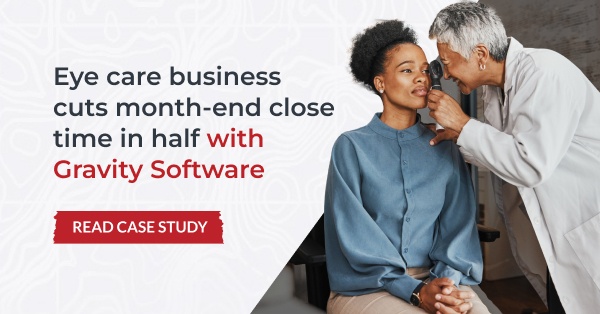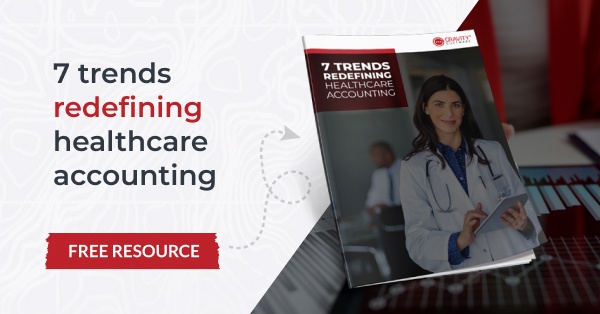Healthcare accounting: The impact of AI and automation

Even in the digital era, many healthcare organizations still rely on manual, paper-based processes and entry-level accounting tools. While electronic health records (EHR) and medical billing systems have advanced patient care, business administrators managing multiple offices often spend hours entering invoices, logging into different databases, and piecing together financial reports.
Fortunately, new technologies are reshaping healthcare accounting, making it faster, smarter, and more accurate.
Why is healthcare accounting needs to change
Strong financial management is critical to the success of healthcare providers, physician groups, and specialty practices. As organizations expand to new locations or add services, accounting processes must:
- Streamline intercompany transactions
- Track expenses across multiple locations, departments, and categories
- Maintain compliance with GAAP and HIPAA standards
- Support a seamless patient experience with modern payment options
Without the right tools, finance teams spend too much time on repetitive tasks instead of driving strategic insights. Many organizations are addressing this by adopting healthcare accounting software designed for multi-entity growth.
Key technologies transforming healthcare accounting
Multi-entity healthcare accounting software
Industry consolidation means physician groups, clinics, and specialty providers now manage multiple offices under one umbrella. Traditional accounting systems force staff to duplicate work across databases.
With multi-entity healthcare accounting software, administrators can manage vendors across locations, generate consolidated reports in minutes, and gain a complete financial view of both individual companies and the entire enterprise. This functionality has become essential for healthcare organizations navigating rapid growth and complexity.
Accounts payable automation in healthcare
According to the Healthcare Financial Management Association, 70% of healthcare suppliers still rely on paper-based invoices. Manual invoice processing wastes time and delays payments.
Modern accounts payable automation reduces these inefficiencies. Large batches of invoices can be processed quickly, routed for approval, and integrated directly into the general ledger. By removing manual data entry, staff are freed up to focus on patient-facing responsibilities and strategic financial initiatives.
Artificial intelligence and machine learning
AI and machine learning are beginning to play a significant role in healthcare finance. Current applications include:
- Automated data entry and verification to reduce errors
- Predictive analytics for patient volume and service demand
- Pattern recognition across financial data for smarter planning
CFOs can use AI in accounting to improve budget forecasts, anticipate revenue shifts, and identify efficiency opportunities across multiple entities.
Business Intelligence tools
Mergers, acquisitions, and expansion across locations create financial complexity. Business intelligence (BI) tools help healthcare leaders monitor performance across entities in real time.
Dashboards highlight where underperformance is occurring, provide cash flow visibility at both the facility and enterprise level, and support faster, more informed decision-making. For healthcare providers managing multiple sites, BI is no longer optional — it is critical to sustaining growth. Platforms like Gravity Insights powered by Power BI make this possible.
Patient payment portals
Patients increasingly expect the same payment options they see in retail — mobile wallets, online portals, and flexible payment terms. Healthcare providers who adapt to these preferences improve both collections and patient satisfaction.
Payment portals that allow patients to view bills, manage transactions, and track their payment history require close collaboration between finance and IT teams. When implemented effectively, they strengthen both operational efficiency and the overall patient experience.
Healthcare accounting best practices for growth
Technology adoption works best when paired with sound financial practices. Healthcare organizations benefit from:
- Intercompany automation to manage transactions across multiple entities
- Expense tracking by department, service line, or location
- Compliance-focused workflows aligned with HIPAA, SOC 2, and GAAP standards
These best practices give healthcare finance teams the structure needed to scale responsibly while maintaining compliance and visibility.
Supporting healthcare organizations with modern solutions
Healthcare providers that modernize their accounting systems gain efficiency, compliance, and real-time insight across multiple entities. Solutions built specifically for the healthcare industry support everything from invoice automation to consolidated reporting and advanced analytics.
Cloud-based platforms such as Gravity Software are designed to handle the unique challenges of multi-entity healthcare organizations, offering HIPAA-compliant security, entity-based access, and audit-ready transparency. Built on the Microsoft Power Platform, Gravity also extends the benefits of AI, automation, and Power BI to finance leaders managing complex operations.
Preparing for the future of healthcare accounting
The future of healthcare finance lies in automation, intelligence, and integrated systems. Organizations that adopt these tools will spend less time on manual processes and more time focusing on patient outcomes, growth strategies, and operational excellence.
For healthcare leaders, the question is no longer if to modernize accounting, but how quickly to make the transition. Solutions like Gravity Software are designed to support multi-entity healthcare providers with the flexibility, compliance, and automation they need to stay ahead.
Ready to see how Gravity Software can transform your healthcare accounting? Schedule a demo today!
Gravity Software
Better. Smarter. Accounting.



